Voices for Change: Syrian Perspectives for An Inclusive Transition Towards Democracy
MBBI has been a partner of the Center for Civil Society and Democracy (CCSD), supporting women in Syria with training, and negotiation support which started in 2013. At MBBI, we begin with creating spaces and platforms for the voices of those at the heart of the conflict, the proximate peacebuilders.

December 20, 2024, demonstration at Umayyad Square in Damascus
Since the beginning of the Syrian revolution (2011), Syrian women, youth and civil society have played a crucial role in the fight for peace and democracy by participating in demonstrations, delivering humanitarian aid, supporting the survival of local communities, supporting the education and health sectors, and fighting ISIS. Throughout the last 14 years, Syrian women have endured unspeakable disasters from the Syrian regime and other actors, such as sieges, bombings, detentions, loss of their loved ones, chemical weapons, lack of representation, displacement, gender-based violence, all while being deprived of their rights and freedom. As the Assad dictatorship ends, likewise, the injustices that Syrian women have been subjected to must end.
As the Assad dictatorship ends, this is a moment of fragility and of historic importance for the future of Syria and the region. New leadership is emerging to lay the groundwork for what is to come for Syrians and therefore it is a critical moment in which to center the voices of Syrians in the country and the diaspora. Too often policymakers base their decisions on the advice of "experts" and ignore the wisdom of those with lived experience and professional expertise, people who are at the heart of the violent conflict.
To address this need MBBI, CCSD, the Alliance for Peacebuilding, ICAN, Vitol Foundation, WO=MEN, Mina's List, and the Rotary E-Club for World Peace invite you to join us for this series of events focused on the transition in Syria. We invite your partnership and support in creating a series of public and private events, in person and online. We are forming a coalition of international organizations and thereby strengthening our collective impact.
The Center for Civil Society and Democracy has worked with thousands of Syrian women, and we have cultivated a resilient network of Syrian peacebuilders. We have listened to Syrians’ needs and reflected on their aspirations. We understand that including women must reflect Syria’s diverse and pluralistic society. We provide the following recommendations for all Syrian, regional, and international actors. We urge them to guarantee women’s rights and meaningful participation in peace and security processes as mandated by UNSCR 2254 with a minimum 30% quota for equality. While we work on the democratic transition in Syria, we call upon all Syrian actors to ensure transparency and accountability mechanisms at each step in the transition process and governance institutions. We call upon you to work with us to achieve a better future for Syria.
We are coming together to provide opportunities for the voices of Syrians; to create spaces for us to hear their needs, concerns and recommendations as we collaboratively support them and advocate for policies and resources within our respective governments as well as with other sectors such as service organizations.
Here is the Vimeo folder of the recordings and audio interpretation in both Arabic and English translations. Password for all assets in the folder: Syria
Key topics:
- Impact of the violent conflict and authoritarian regime
- Immediate needs and concerns during transition
- Network members share their experiences, concerns and recommendations for the immediate future
- Identify intermediate and long-term needs
January 23rd Event
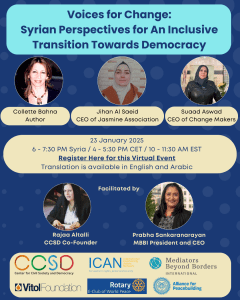
Join speakers Collette Bahna, Author, Jihan Al Saeid, CEO of Jasmine Association, and Suaad Aswad CEO of Change Makers as they share their insights on the future of Syria. This event will be facilitated by Rajaa Altalli, CCSD Co-Founder, and Prabha Sankaranarayan, MBBI President and CEO and will be translated in Arabic and English.
Colette Bahna is a Syrian writer, media personality, and human rights advocate with a diverse and accomplished career. She has authored six books in the field of literature and contributes as a freelance writer to various Arab and international media platforms, including Alhurra. In addition to her literary work, Colette has made a significant impact in the field of drama, having written numerous television series, films, and two theatrical plays. Renowned for her dedication to human rights, she has received several awards recognizing her achievements and contributions. Colette is also an active member of the coordination committee for the "Space for Cooperation" initiative.
Jihan Mahaood Al Saeid is a community advocate with extensive experience in project coordination, education, and psychosocial support. As chairwoman of the Jasmine Association, she oversees impactful initiatives like “Grass of Hope” and “Jasmine Oven,” empowering civil society and supporting displaced communities. With a Sociology degree from Euphrates University, Jihan has facilitated UNICEF and other local international and local-sponsored art exhibitions, awareness campaigns, and educational programs.
Suaad Aswad has extensive experience in advocating for women's and children's rights in northwest Syria. She previously served as the Director of the Women and Children's Affairs Office within local councils, where she played a key role in addressing community needs. From 2019 to 2022, Suaad worked as the Executive Director for the "Hand in Hand We Build Tomorrow" project, which focused on raising awareness about the dangers of child marriage in the region. Currently, she is the Executive Director of the Change Makers Team, an organization dedicated to empowering women and championing their rights in northwest Syria.
Read with the Report from the first session here.
Key topics:
- Key challenges from the earthquake two years ago
- Recovery efforts internationally
- Recent regime change's impact on humanitarian efforts
February 20th Event
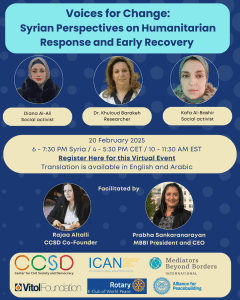
Dr. Khuloud Barakeh, Diana Al-Ali, and Kafa Al Bashir will share their personal experiences, and insights into the needs and expectations of local and international stakeholders. This is a critical opportunity to understand how the recent political developments are shaping humanitarian responses and what can be done to support those in need.
Diana Al-Ali, Director of Souriana Organization, is a community activist and director of the Souriana Organization. Since founding the organization, she has dedicated her efforts to advocating women empowerment whether economically, politically or socially, ensuring they play a vital and influential role in society. Founded in 2018 by a group of activist women, Souriana focuses on humanitarian efforts, peacebuilding, and early recovery, with a special focus on women’s empowerment. Key projects included economic empowerment initiatives, a campaign to assist earthquake-affected communities, and a literacy program for women and girls.
Khuloud Barakeh: Founder, Director of Impact Zone, is a Syrian researcher and academic specializing in education and women's empowerment, she holds a PhD in Education from the University of Damascus where she later served as an Associate Professor. She has extensive experience in women's advocacy, co-founding the "Syrian Women for Democracy" coalition and the "Syrian Women for Peace and Democracy" initiative, actively engaging in UN negotiations. Her research focuses on gender-based violence, constitutional gender perspectives, and CEDAW. She also leads Impact Zone, a training and consulting firm, and is a certified trainer in T.O.T. and teacher training.
Kafa Al Bashir is a humanitarian activist and development specialist with expertise in human resources, project management, and monitoring and evaluation. She has led peacebuilding and community initiatives in conflict-affected areas, focusing on women's empowerment, justice for missing persons, and sustainable development. As Director of the "Permanent Peace for Development" Organization, she oversees projects that improve living conditions and strengthen local communities, with a special emphasis on supporting women in education, health, and economic development.
Read with the Report from the second session here.
Key topics:
- Human Rights in Syria
- Activist and Lawyer Perspectives
- Syrians are demanding equal rights and advocating for increased representation and fair policies.
March 26th Event
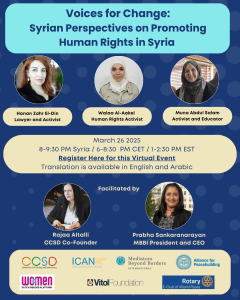
Our speakers Hanan Zahr El-Din, Walaa Al-Akel, Muna Abdul-Salam will assess the current landscape of human rights work, evaluate the challenges and needs, and discuss the role of civil society and international organizations in shaping the future of human rights in Syria.
Hanan Zahr El-Din is a lawyer and human rights activist specializing in international law and human rights, with extensive experience in advocating for women's rights and reforming discriminatory laws. She has contributed to shadow reports for the CEDAW Committee and helped draft constitutional principles with a gender perspective. She has held leadership roles in several human rights organizations, including the Syrian Women’s Network and "Together for Women’s Issues." With a background in media, she has written articles on women's issues and participated in training programs on constitution-building, negotiation, transitional justice, and international humanitarian law. Since 2011, she has been actively engaged in human rights and political activism, striving for justice and democracy in Syria.
Walaa Al-Akel is a human rights advocate with extensive experience in transitional justice, psychosocial support, and human rights documentation. She has worked with various organizations facilitating justice sessions, supporting survivors, and documenting violations. She is a founding member of the Survivors’ Network and plays a dynamic role in civil society leadership. With a diploma in Administrative and Financial Sciences from Damascus University and ongoing studies in engineering, she has completed multiple training programs in psychosocial support, strategic planning, and crisis response. Walaa remains committed to justice, survivor support, and strengthening civil society in Syria.
Muna Abdul-Salam is feminist activist and educator dedicated to women's empowerment and gender justice. She is the founder and director of Rose Organization for Support and Empowerment and a founding member of Sara Organization for Combating Violence Against Women, where she served as Executive Director and led the legal committee supporting survivors of abuse. Muna has played a key role in organizing and leading initiatives on gender-based violence, child marriage, women's political participation, and youth life skills. Through her advocacy and leadership, she continues to champion women's rights and social justice
Read with the Report from the third session here.
Key topics:
- The evolving role of youth in Syria’s political transition
- The challenges they face on the ground
- What it takes to create space for meaningful youth participation in shaping peace and democracy
April 23rd Event
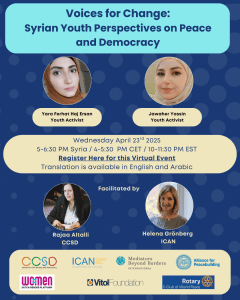
In this robust discussion, our speakers will share their personal reflections on their journeys, bold ideas for a post-conflict Syria, and a vision for a more inclusive, just, and democratic future. Don’t miss this rare opportunity to hear directly from the voices of Syria’s next generation of leaders.
Yara Haj Ersan is committed to advancing democratic values and civic engagement in Syria. With hands-on experience in the humanitarian and development sectors, she contributes to youth empowerment and democratic resilience. As a participant in a CCSD’s program to strengthen youth-led civil society organizations for sustainable peace, Yara continues to be at the forefront of efforts to create lasting, community-driven change. She facilitated community dialogues, led awareness and advocacy sessions, conducted key informant interviews and focus groups with displaced populations, and coordinated activities that promoted accountability and participation. With a background in Computer Systems Engineering, she blends technical expertise with grassroots activism to foster inclusive spaces where young people can shape their future and drive positive change.
Jawaher Yassin has a background in chemistry and a deep commitment to social change. Jawaher is a Syrian civic activist with extensive experience in youth and women’s empowerment, community development, and cultural dialogue. She founded Khayzaran Cultural Forum, which promotes social awareness through cultural dialogue. As a member of the youth cohort at the Center for Civil Society and Democracy (CCSD), she has actively participated in youth forums and peacebuilding workshops. Her work extends to several respected organizations, including where she has led advocacy, project management, and conflict resolution training. Through every role, she remains committed to creating safe, inclusive spaces where young people—especially women—can lead, collaborate, and drive transformative change in their communities.
Read with the Report from the fourth session here.
Key topics:
- The experiences of countries that have navigated political transitions.
- Democracy, inclusion, and justice.
- Explore what Syrians can learn from these global experiences and how such lessons might be adapted and applied in the Syrian context as it seeks a path forward.
May 21st Event
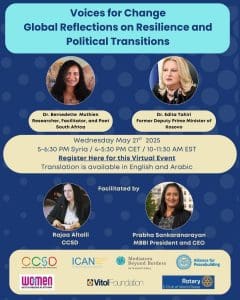
In the May session of our Voices for Change series, we will focus on the valuable lessons learned from the experiences of countries that have navigated political transitions. This conversation will feature speakers from diverse national backgrounds who have been directly involved in and have studied transitions toward democracy, inclusion, and justice. Our guests will share their insights into the specific challenges their countries faced — ranging from rebuilding institutions and transitional justice to social reconciliation. They will address how they overcame/are overcoming those complexities to lay the foundations for more democratic and inclusive societies. The discussion will explore what Syrians can learn from these global experiences and how such lessons might be adapted and applied in the Syrian context as it seeks a path forward. This session will not only inform but will inspire. By fostering a cross-border dialogue on resilience, civic engagement, and democratic values, we hope to encourage Syrians—inside the country and in the diaspora—to reflect on the opportunities that come with political transitions and to imagine possibilities for a future Syria rooted in justice, equity, and pluralism.
Dr. Bernedette Muthien is a Research Fellow in the Office of International Affairs at the University of the Free State. With senior roles in academia, government, and civil society across South Africa and beyond, she is a seasoned researcher, facilitator, and poet. She has over 200 publications and presentations, many translated into 17 languages. A Fulbright-Amy Biehl Fellow at Stanford, she holds advanced degrees in Political Studies from the Universities of Cape Town and Stellenbosch. Bernedette co-founded the African Peace Research and Education Association and serves on multiple international advisory boards focused on peace, security, and cultural rights.
Dr. Edita Tahiri is a prominent leader of Kosovo’s independence movement, with over 30 years of experience in foreign policy, peace negotiations, and post-conflict transitions. She has served in several positions for Kosova, including Deputy Prime Minister, Minister of Foreign Affairs, Minister of Dialogue, and a five-term Member of Parliament. As Kosovo’s Chief Negotiator in the EU-facilitated dialogue with Serbia (2011-2017), she signed the first-ever agreement between Kosovo and Serbia. Dr. Tahiri was the only woman peace negotiator in the Balkans during key international peace processes, including the Rambouillet Conference (1999). She chairs the Regional Women’s Lobby in Southeast Europe (RWLSEE) and is an active member of Women Waging Peace. She is a Fulbright Scholar and speaks Albanian, English, Croatian, Serbian, and Turkish.
Read with the Report from the fifth session here.
Key topics:
- The experiences of countries that have navigated political transitions.
- Democracy, inclusion, and justice.
- Explore what Syrians can learn from these global experiences and how such lessons might be adapted and applied in the Syrian context as it seeks a path forward.
June 24th Event
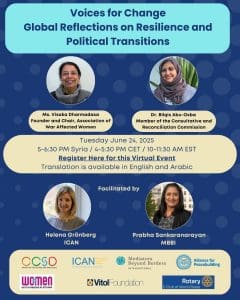
Join us for another compelling session in our Voices for Change series, featuring two trailblazing women who have led transformative efforts for peace, justice, and political inclusion in their home countries of Sri Lanka and Yemen. Through decades of frontline work—from peace negotiations and ceasefire mediation to grassroots organizing and political advocacy—Visaka Dharmadasa and Dr. Bilqis Abu-Osba have challenged exclusion, elevated women’s leadership, and forged new paths for civic participation in the midst of conflict and transition. Together, they will reflect on the power of civic leadership in times of crisis, the critical importance of inclusive national dialogue, and how women’s voices and experiences shape more just and sustainable futures. Drawing on their lived experiences and strategic engagement with governments, communities, and international actors, they will explore how inclusive processes can heal divided societies, reclaim public space, and ensure that transitions center human rights and dignity. Their insights offer not only powerful inspiration but also concrete lessons for Syrians seeking to navigate complex political realities and build a future grounded in justice, accountability, and democratic values.
Visaka Dharmadasa is the founder and Chair of the Association of War Affected Women and Parents of Servicemen Missing in Action. A key peacebuilder during Sri Lanka's civil war, she helped broker the ceasefire between the government and the LTTE and united women across conflict lines. She educates soldiers and leaders on international humanitarian law and promotes UN Resolution 1325 on women, peace, and security. Visaka trains women for political leadership and power sharing, and in 2023 facilitated a historic dialogue between Buddhist monks and the Tamil diaspora, resulting in the six-point Himalaya Declaration. Her work has earned multiple honors, including the 2006 Humanitarian Award from InterAction (Washington D.C.), the 2022 Human Rights Salutation, and the 2024 USIP Women Building Peace Award. A nominee for the 2005 collective Nobel Peace Prize, she has advised the Sri Lankan government and international bodies on reconciliation and human rights. She is affiliated with numerous peace networks, including WASL, GPPAC, and the Global Network of Women Peacebuilders, and holds a Harvard degree in negotiations, mediation, and women’s security.
Dr. Bilqis Abu-Osba is a professor of political science and gender studies at Sana'a University, with extensive experience in government, civil society, and humanitarian work. She served as Vice-President of Yemen’s Supreme National Authority for Combating Corruption and has represented Yemen and Yemeni women at numerous international forums. In 2005, she founded the Awam Cultural Development Foundation to support women’s political participation. Dr. Abu-Osba has played a key role in establishing networks and alliances advocating for women and youth, particularly during Yemen’s transitional period. During the National Dialogue Conference, she led advocacy campaigns to amplify women’s voices. She has participated in three rounds of peace negotiations—in Kuwait, Geneva, and Sweden—and was among the women invited to the signing of the Riyadh Agreement. She currently serves on the Women’s Advisory Group to the UN Envoy to Yemen and is a member of the political committee from the Riyadh consultations. She also contributes to the consultation and reconciliation body supporting Yemen’s Presidential Leadership Council, continuing her vital role in advancing peace and political inclusion
Read with the Report from the sixth session here.
Key topics:
- Syrian and Afghan women in dialogue
- Building a future rooted in resilience and transformation
- The critical role of women’s leadership in contexts of transition
September 18th Event
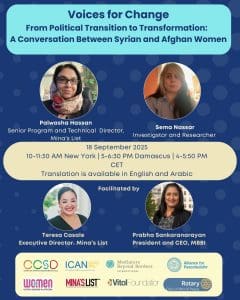
Join us as we listen to Syrian and Afghan women in dialogue, amplifying their insights, best practices, and calls to action for building a future rooted in resilience and transformation. Speakers Palwasha Hassan and Sema Nassar will reflect on their experiences of leading through moments of profound transition. Coming from two regions that have faced conflict, upheaval, and shifting political landscapes, these women will share how they have mobilized communities, built resilient civil society structures, and drawn on the strength of diaspora networks to sustain hope and drive change. The dialogue will spotlight the critical role of women’s leadership in contexts of transition, explore the lessons learned from their journeys and the strategies that have enabled them to transform challenges into opportunities for stronger, more inclusive communities.
Sema Nassar is a human rights defender with a focus on detainees and forcibly disappeared persons. Since the early stages of the Syrian conflict, she worked on documenting human rights violations and sexual violence in detention centers. Sema contributed to numerous reports and policy papers on documentation, gender-sensitive accountability, and legislation concerning missing persons, including work with the Conflict and Civicness Research Group at LSE IDEAS. She is a co-founder of multiple initiatives, such as the ‘We’ Network for WHRD in the MENA region and Urnammu for Justice and Human Rights. Sema continues to share her expertise with civic actors and support feminist initiatives in the diaspora, and serves as an investigator with Dar Justice and as a research consultant at the LSE Middle East Centre.
Palwasha Hassan is Senior Technical and Program Director for Mina’s List, overseeing global program implementation. With over 26 years of experience in gender, development, humanitarian aid, and peacebuilding, she has held leadership roles including Executive Director of the Afghan Women’s Educational Center and founding member of the Afghan Women’s Network. She helped establish the women’s quota in Afghanistan’s constitution and launched Roazana, the country’s first women’s legal support organization. Hassan has also facilitated regional dialogues in Pakistan, Iran, and Central Asia to promote human rights, peace, and democracy. A Nobel Peace Prize nominee in 2005, she was a finalist for the Sakharov Prize and received the Hillary Rodham Clinton Award for exceptional leadership. She holds a master’s in Post-war Recovery Studies from York University, UK.
Read with the Report from the seventh session here.
Key topics:
- Syrian and Libyan women in dialogue
- Whether societies move toward stability, justice, and democracy—or fall back into cycles of repression and instability
- The critical role of women’s leadership in contexts of transition
October 23rd Event
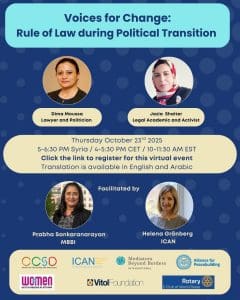
We are pleased to invite you to the next session of Voices for Change, taking place on Thursday, October 23, 2025, online via Zoom. This session will focus on The Rule of Law during Political Transition, a timely discussion in contexts marked by conflict and authoritarianism. Moments of political transition often determine whether societies move toward stability, justice, and democracy—or fall back into cycles of repression and instability. This session will explore how strengthening justice systems and legal institutions provides a foundation for protecting rights, ensuring accountability, and rebuilding public trust.
Dr. Jazia Jibril Shaitir: is an Associate Professor at the Faculty of Law, University of Benghazi, and a prominent legal scholar and activist in criminal law. She has held leadership and advisory roles in academia, contributed to key national legislation including laws on violence against women and national reconciliation, and has extensive experience in legal and security training. Dr. Shaitir has collaborated with international universities and organizations such as Leiden University, UNDP, and ESCWA, and is active in civil society. She has appeared in local media providing legal and human rights analysis and is the author of Legal Reflections: Critical Readings on Libyan Legislation.
Dima Moussa: Damascus-based Syrian lawyer and politician. She holds a bachelor’s degree in electrical engineering and a Juris Doctor, both from the United States, where she practiced law until the end of 2012. Actively engaged in the Syrian political opposition since 2011, she joined the Syrian National Coalition in 2016 and became a founding member of the Syrian Women’s Political Movement in 2017. Moussa was elected Vice President of the Syrian National Coalition in May 2018, serving two consecutive terms until July 2020, and was re-elected in September 2023, a position she held until the fall of the former Syrian regime in December 2024. Currently, she focuses her work on transitional justice, alongside broader issues as a legal expert.
Read with the Report from the eighth session here.
Key topics:
- Syrian and Filipino women in dialogue
- What inclusive negotiations can teach us about building democratic and lasting peace
- The critical role of women’s leadership in contexts of transition
November 20th Event
 Join us for the final Voices for Change conversation of the year — a powerful discussion on Negotiations for an Inclusive Political Transition. Together with our partners, we’ll bring leading peacebuilders and advocates to reflect on what inclusive negotiations can teach us about building democratic and lasting peace. This marks the conclusion of this year’s series, but stay tuned — Voices for Change will return next year with new perspectives and inspiring speakers!
Join us for the final Voices for Change conversation of the year — a powerful discussion on Negotiations for an Inclusive Political Transition. Together with our partners, we’ll bring leading peacebuilders and advocates to reflect on what inclusive negotiations can teach us about building democratic and lasting peace. This marks the conclusion of this year’s series, but stay tuned — Voices for Change will return next year with new perspectives and inspiring speakers!
Sawsan Zakzak: Women’s Rights Advocate and Leader. Sawsan holds a Bachelor’s degree in Arabic Literature and has been a member of the Syrian Women’s League since 1990. She worked as part of the League’s research team on various issues related to Syria, including unpaid work of women, gender-based violence in armed conflict, and discrimination in personal status laws through a comparative study. She also served as Gender Sector Coordinator in the National Agenda for the Future of Syria. She has been a member of the Women’s Advisory Council since 2016.
Mariam Coronel- Ferrer: Peace Negotiator and Scholar. Miriam Coronel-Ferrer is a founding member of the Southeast Asian Women Peace Mediators and former UN Standby Team Mediator, supporting peace efforts in Afghanistan, Iraq, and other countries. She chaired the Philippine government panel that signed the 2014 Comprehensive Agreement on the Bangsamoro, becoming the first woman to lead and sign a major peace accord with a non-state armed group. A retired University of the Philippines professor, she serves on the boards of the International Crisis Group and Interpeace and received the 2015 Hillary Rodham Clinton Award for Advancing Women in Peace and Security.
